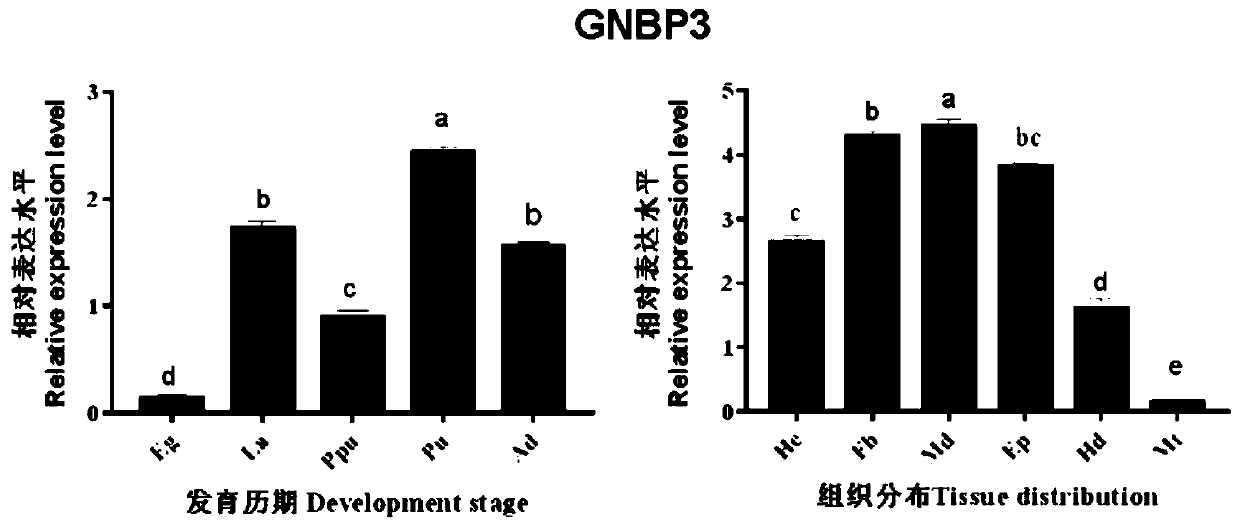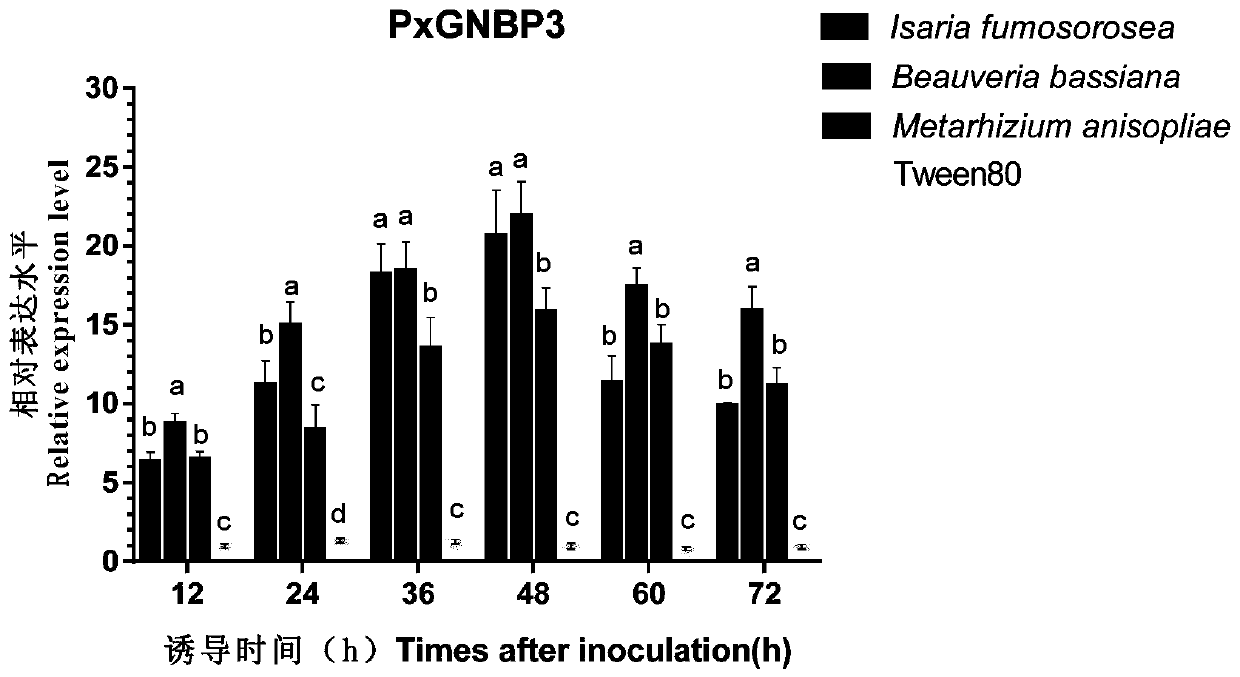Recombinant fungus targeting expression of silent pest-pattern recognition protein GNBP3 gene and application of recombinant fungus in pest control
A technology of pattern recognition receptors and recombinant bacteria, applied in applications, fungi, genetic engineering, etc., can solve problems such as the identification of escaping and invading microorganisms, shorten the death time, improve the use efficiency and range of use, and increase the mortality rate Effect
- Summary
- Abstract
- Description
- Claims
- Application Information
AI Technical Summary
Problems solved by technology
Method used
Image
Examples
Embodiment 1
[0057] Cloning of Example 1 Plutella xylostella gram-negative bacteria binding protein gene GNBP3 cDNA sequence
[0058] 1. Experimental method
[0059] 1. Unigene amplification of GNBP3 gene
[0060] According to the Plutella xylostella transcriptome database determined in the laboratory, the GNBP3 Unigene sequence was obtained through bioinformatics analysis and screening. In order to ensure the correctness of the sequence GNBP3, a pair of Unigene primers (GNBP3FUni and GNBP3RUni) were designed. The primer sequences are shown in Table 1.
[0061] Using Plutella xylostella cDNA as a template, the Unigene sequence was amplified by PCR. After the product was recovered, T cloned, and after the recombinant plasmid was extracted, pMD18-T-GNBP3 was digested with PstI and EcoR I to identify the recombinant plasmid pMD18-T-GNBP3. The correct recombinant plasmid pMD18-T-GNBP3 was sent to Guangzhou Aiji Biotechnology Co., Ltd. for sequencing. The sequencing results were compared with...
Embodiment 2
[0067] The spatio-temporal expression pattern of embodiment 2 diamondback moth GNBP3 gene
[0068] 1. Experimental method
[0069] Samples of different developmental stages of healthy Plutella xylostella were selected, including eggs, larvae, prepupa, pupae, and adults. Healthy 4th instar Plutella xylostella larvae were selected and dissected on ice to collect six tissue samples including head, hemolymph, midgut, Malpighian tubules, fat body and epidermis.
[0070] Extract total RNA and synthesize first-strand cDNA from all samples. According to the full-length cDNA sequence of Plutella xylostella GNBP3 and the cDNA sequence of RPS13 gene of Plutella xylostella, two pairs of fluorescent quantitative PCR primers were designed respectively. GNBP3 quantitative primers are GNBP3 primers GNBP3-qF and GNBP3-qR, Rps13 primers are Rps13-qF and Rps13-qR, the primer sequences are shown in Table 1, RT-qPCR reaction system is 25 μL: ddH2O 8.5 μL, SYBR Premix ExTaqⅡ 12.5 μL, upstream Pr...
Embodiment 3
[0073] Example 3 Sensitivity Detection of Plutella xylostella GNBP3 Gene to Fungi
[0074] 1. Experimental method
[0075]Three kinds of entomogenous fungi preserved in the laboratory, Beauveria bassiana, Metarhizium anisopliae and Isaria fumosorosea were transferred to PDA plates, and then placed in a 25°C incubator ( 12L:12D) for 7 days. After sporulation, add 20mL 0.05% Tween-80 solution on the plate, gently scrape the spores on the plate with an inoculation loop, pour the prepared solution into a beaker, and stir with a magnetic stirrer for 30 minutes. After the spores are completely dispersed, filter the bacterial liquid with double layers of medical gauze to obtain a spore suspension. Use a hemocytometer to count the concentration of spores in the mother liquor, and use 0.05% Tween-80 solution to make 1.0×10 8 CFU / mL of spore suspension for later use.
[0076] The larvae of Plutella xylostella xylostella on the first day of the 4th instar were selected and treated w...
PUM
| Property | Measurement | Unit |
|---|---|---|
| Molecular mass | aaaaa | aaaaa |
Abstract
Description
Claims
Application Information
 Login to View More
Login to View More - R&D
- Intellectual Property
- Life Sciences
- Materials
- Tech Scout
- Unparalleled Data Quality
- Higher Quality Content
- 60% Fewer Hallucinations
Browse by: Latest US Patents, China's latest patents, Technical Efficacy Thesaurus, Application Domain, Technology Topic, Popular Technical Reports.
© 2025 PatSnap. All rights reserved.Legal|Privacy policy|Modern Slavery Act Transparency Statement|Sitemap|About US| Contact US: help@patsnap.com



